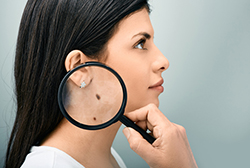
April is Stress Awareness Month, a time to recognize how stress can wreak havoc on your skin. In fact, many studies demonstrate that stress affects the onset and exacerbation of skin disease. Here's how to identify, prevent, and treat stress-related skin issues.
Identifying Stress-Related Skin Issues
Acne Breakouts: Stress can trigger hormonal fluctuations, leading to increased oil production and acne breakouts, especially on the face, chest, and back.
Eczema or Psoriasis Flare-ups: Stress weakens the skin barrier, making it more susceptible to inflammatory skin conditions like eczema or psoriasis, characterized by redness, itching, and flakiness.
Dryness and Dullness: Chronic stress can impair the skin's ability to retain moisture, resulting in dry, dull, and rough skin texture.
Premature Aging Signs: Stress accelerates the aging process by promoting the production of free radicals, leading to wrinkles, fine lines, and sagging skin.
Preventing Stress-Related Skin Issues
Practice Stress Management Techniques: Engage in stress-relieving activities such as yoga, meditation, deep breathing exercises, or hobbies to reduce cortisol levels and promote skin health.
Maintain a Healthy Lifestyle: Adequate sleep, regular exercise, and a balanced diet rich in antioxidants, vitamins, and omega-3 fatty acids can bolster skin resilience against stress.
Establish a Skincare Routine: Cleanse, moisturize, and protect your skin daily with gentle skincare products suitable for your skin type to minimize the impact of stressors.
Limit Alcohol and Caffeine Intake: Excessive alcohol and caffeine consumption can exacerbate stress and dehydrate the skin, leading to inflammation and skin barrier impairment.
Treating Stress-Related Skin Issues
Topical Treatments: Use over-the-counter or prescription topical treatments containing ingredients like salicylic acid, benzoyl peroxide, retinoids, or corticosteroids to address acne, eczema, or psoriasis symptoms.
Hydration: Moisturize your skin regularly with hydrating creams or serums to replenish moisture and improve skin barrier function.
Anti-inflammatory Agents: Apply topical products containing soothing ingredients such as aloe vera, chamomile, or colloidal oatmeal to alleviate redness, itching, and inflammation associated with stress-related skin conditions.
Professional Treatments: Seek dermatological interventions such as chemical peels, laser therapy, or injectables for severe or persistent stress-related skin issues under the guidance of a dermatologist.
By being mindful of the effects of stress on your skin and implementing preventive measures and appropriate treatments, you can minimize stress-related skin problems and maintain a healthy, radiant complexion.





